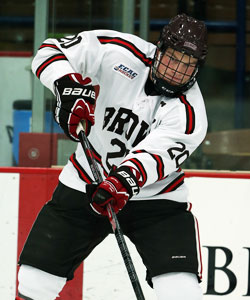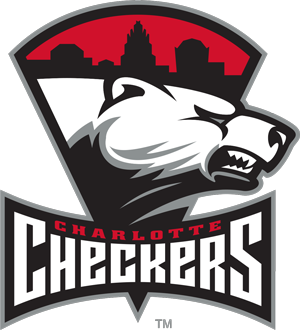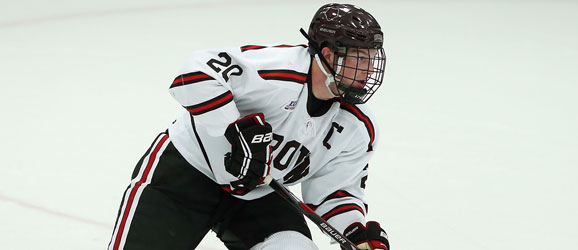Robertson took in his first professional practice at the Checkers’ morning skate on Friday, even sneaking into the annual team photo just prior. With six healthy defensemen ahead of him and the team in the thick of a playoff race where every single point will matter, he won’t be in the lineup for that night’s game against the San Antonio Rampage but the door remains at least somewhat open moving forward.
“We’ll just see where he’s at,” said coach Jeff Daniels. “Right now he’s the seventh guy just based on the numbers we have. I told him today that there are no promises as far as what’s going to happen but he’s got to prepare every day like he’s ready to play.”
“I’m coming in with a blank slate,” said Robertson, a 22-year-old who finished a four-year career at Brown University earlier this month. “If I can get in the lineup that’s great and I’ll be excited, but for right now I’m just trying to learn as much as I can about the pro game.”

Having just arrived the night before his first practice and not wanting to interfere too much in the team’s game-day preparations, Robertson said that his discussions with those players have been limited thus far. That said, they’re willing to give advice on what is admittedly a big adjustment when the opportunity comes.
“The game is a lot faster,” said Woods, still sidelined with an injury that has kept him out for the last month. “You’re playing with older guys where in college you’re only playing with guys that are 18 to 23 or 24. You’ve got to change the system that you play in college, meet the guys and get used to playing with them.”
Helping Robertson’s case is that he’s a bit older and more experienced than many of the players who make these late-season cameos, some of which can be as young as 18 with a season or two of major junior eligibility remaining. With that in mind, his biggest hurdle may be shaking off a week or two of rust since team activities concluded at Brown – an early goal of his long post-practice skate with Glen Wesley, who helps develop the Hurricanes’ defensive prospects.
“I’ve been skating but the rest of the team hasn’t been, so it’s definitely been a little bit of a step up in pace and a bit of a shock to the system getting back out there at 100 percent,” said Robertson. “I knew the first day was going to be tough and they put me through the ringer a little bit too, which is good.”
Those sessions will also help the staff get a better look at a player who has only been in the organization for a few months. The Hurricanes acquired Robertson, a sixth-round draft pick of the Toronto Maple Leafs in 2011, along with John-Michael Liles in exchange for Tim Gleason during the annual NHL Winter Classic on New Year’s Day.
“I actually found out on the bus when one of the guys saw it on his Twitter feed and said, ‘Hey did you get traded?’ I just said, ‘Uh, no?’ It was actually pretty funny. I didn’t expect that seeing as how I hadn’t even laced up for a pro practice yet, but it was cool to see my name on the ticker there on some of the NHL networks.”
According to Daniels and Wesley, Ron Francis, the Hurricanes’ vice president of hockey operations, has had the chance to see Robertson in person a few times since the trade. That’s helped them get something of a read on his capabilities as a tough, character defenseman, but the acquaintance between organization and player is still very much developing.
“You can do all you want in practice and work with his skills, but until he gets in a game and you’re able to teach and let him learn from the things that he’s good at and things he’s got to get better at, it’s going to be a feeling-out process,” said Wesley.
In earning First or Second Team honors in each of his four seasons, Robertson did a bit of everything at Brown. He’s coming off a campaign in which he led the team in penalty minutes, blocked shots, plus/minus and power-play goals while serving as team captain for the second time.
“I pride myself on being more of a shut-down guy and a physical defenseman that’s going to win battles, but if I can chip in at the blue line, get a shot through the point or create a rush, I’ll chip in whatever way I can,” he said.
That said, he understands that what gets him into the lineup will be his ability to take care of his own end first. He should be able to do that based on his physical tools, which is where the feeling-out process comes in.
“I believe it’s a gift where some guys come out of junior and they may be 19 years old and physically ready, same thing with some guys coming out of college, but then you see guys come out of college their freshman year and they’re not ready,” said Wesley. “It’s a tough way to look at it, but I think in Dennis’ case he’s a big strong defenseman and I think physically he’ll be ready. The sharpness and the speed aspect is probably going to take some time because his team has been out for a week and a half to two weeks. It’s a process.
“Jeff said he doesn’t know when the time is going to come, but we told him to start to work hard, get prepared and see what happens over the course of the last 13 or 14 games.”





